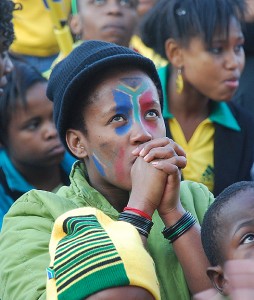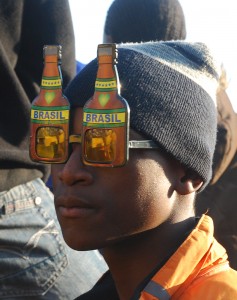Posted on June 18th, 2010 by Amanda Atwood. Filed in Governance.
Comments Off
The Constitution Parliamentary Committee (COPAC) Outreach Programme is finally set to begin next week. In light of this, the ZESN/ZPP/ZLHR Independent Constitution Monitoring Project (ZZZICOMP) will be monitoring this process. Here is an excerpt of its press statement this week:
ZZZICOMP welcomes the long awaited launch of the Constitution Parliamentary Committee (COPAC) Outreach Programme on Wednesday 16 June 2010 by the three principals to the Global Political Agreement (GPA) President Robert Mugabe, Prime Minister Morgan Tsvangirai and Deputy Prime Minister Arthur Mutambara.
Of particular importance was the call by the Principals for peace and non-violence during the public outreach process in keeping with the provisions of Article 6 of the GPA, “it is a fundamental right and duty of the Zimbabwean people to make a constitution by themselves and for themselves” and “that the process of making this constitution must be owned and driven by the people and must be inclusive and democratic”. We acknowledge the commitments made by the Principals that the process must be undertaken in conditions that uphold the principles of inclusivity, tolerance, transparency and openness.
ZZZICOMP had noted with concern that prior to the official launch of the outreach; the process has been characterized by inordinate delays in the commencement of the outreach programme as stipulated in Article 6 of the GPA. The operating environment remains largely repressive thus impacting negatively on the participation by the public in the reform process.
Furthermore, as the outreach was being launched, the public was and still is clueless as to the dates on which the various teams will visit their respective wards as well as sequencing of the meetings. We believe this information is essential for the public to plan for their participation in the process.
In line with fulfilling its monitoring role ZZZICOMP will independently assess and evaluate the constitution-making process against established principles, benchmarks and standards of constitutionalism and constitution-making, including openness and transparency, inclusivity, legitimacy, accessibility and receptiveness.
Our goal is to objectively monitor, observe and report on the work of the Constitution Parliamentary Select Committee (COPAC), the public outreach programme, the work of the Thematic Committees and the Drafting Committee, and the final document produced in order to adjudge how democratic and transparent the constitution-making process is, and if it accurately reflects the input of broad and diverse popular participation. To this end, ZZZICOMP has deployed 420 monitors, as well as provincial coordinators and other key personnel on the ground across the country, who have all along been observing the operating environment in general, and are now well prepared and ready to monitor the process. Our monitoring teams are dispersed nationwide in order to systematically gather information during the consultative processes, to comment on the operating environment and any breaches of the IPA in relation to the process, and to highlight any violations, violence, or other discrepancies which occur in the constituencies and wards in which they are operating.
For further information and comments please contact ZZZICOMP on zzzicomp [at] gmail [dot] com
Posted on June 18th, 2010 by Amanda Atwood. Filed in Governance.
Comments Off
I’ve just been listening to audio clips from Derek Matyszak and Rudo Gaidzanwa’s thought provoking presentations at a recent SAPES seminar on gay rights and the Constitution.
Gaidzanwa says some interesting, controversial things, such as:
In Zimbabwe there is also the issue of HIV because of men having sex with men, which people don’t want to deal with; not the health workers, not the government, not anybody. Somehow people pretend that it’s not there. Quite a lot of married men have sex with both men and women in Zimbabwe, but it’s never something that is admitted, its never put in the public domain. Those men, when they go into the clubs in Harare, they’ll be consorting with other men who are gay, and they (the openly gay men) say but what are you doing here since you are heterosexual? And they say Mukadzi wangu ari kumusha (my wife is in the rural areas).
You can read and listen to this discussion here
Posted on June 18th, 2010 by Dydimus Zengenene. Filed in Economy, Media, Uncategorized.
1 comment filed
Zimbabwe’s formal economy has been struggling to survive whilst the informal sector has become the key to livelihood. There seems to be a change for the better in many sectors including the fuel sector where service stations now have good stocks of the precious liquid. But black market activities have not ended completely. As one drives up to the pumps in most service stations a swarm of young boys approach you selling coupons at a price cheaper than that pump price.
One wonders how this illegal business is viable given that the fuel price is on the rise the world over? My talk to one informal trader of coupons provided a shocking revelation, which left me close to bursting with anger. He said some people have diesel coupons yet they want petrol so they negotiate an exchange with these dealers who in turn charge a fee for the deal. It also emerged that some people have easy access to coupons, which they sell at a discount on the black market. It also emerged that the key suppliers of fuel are government officials including Members of Parliament who offload thousands of liters on the black market in the form of coupons.
The vendor revealed that yesterday (17 June 2010) some of his colleagues had a fight over about 5000 liters of fuel coupons, which a certain MP had come to offload at the BP Service Station on the corner of Fourth Street and Samora Machel Avenue. The dealers normally buy one 25-litre fuel coupon at US$22 and sell at US$25. The MP is said to have come with two full books of coupons of which one is 2500 liters worth of coupons. The MP is said to have asked the boys to offer good money, and they started bidding against each other, until they could buy the two books at US$24 per coupon.
The fight and the supply of fuel is not my problem; but the problem is where do these MPs get that much of fuel to sell on the black market? It becomes suspicious especially at a time when these MPs are set to take on a big role in the constitution making process. To make the deal more suspicious the MP is reported to have refused to receive the money on the spot. Instead he offered to carry the boys to some unnamed hotel to finish the deal. The government is broke and civil servants are sacrificing themselves to work without enough take-home money. Yet the politicians are busy lining their pockets with national resources. Lately the MPs have been demanding unrealistically hefty rewards for taking part in the constitution making process.
If they get these coupons from the government, one wonders how one person is given that many coupons at once? The administration has a case to answer. It is really disappointing to note that corrupt tendencies are at the top of the government. How will we heal the economy when the healing system comprises rotten elements? The first healing step is to bring these elements to book. Who then should lead the investigation and the arrest of these people?
Posted on June 18th, 2010 by Bev Clark. Filed in Media, Uncategorized.
Comments Off

First they prayed and now they’re in mourning. Bafana Bafana . . . will they still get through?
Posted on June 17th, 2010 by Dydimus Zengenene. Filed in Reflections, Uncategorized.
2 comments filed
Last weekend I took time visit the popular place in Ruwa, kwa “Mother” as it is popularly known. It is a remote hideout just after Ruwa as we enter the farm area known to belong to the Prisons Commisioner, General Zimhondi. Just as 1:30 pm neared scores of men started trickling in and suddenly the place was full of people waiting for the start of a match between Algeria and Slovenia. Great indeed to see people, mostly men, gathered in one place, enjoying the contents of the brown bottle and having one thing in common – “Soccer”.
After this match was to come another two. The most awaited one being the one between Germany and Australia, which was to start at 8:30 pm. People were already promising to wait for all the matches. At another bar I heard people were made to pay US$3 at the door in order to enter to watch soccer. It is a nice time indeed for the bar owners who have boosted daily sales from about 1pm to 10pm.
Though these days are full of joy and fun; betting, gaining and losing, there is one group complaining back home. That of women who are not so much of soccer fans but still need the company and attention of their husbands. Men are aware of it but they don’t want to leave their friends to go and watch the games at home where there is not much noise and support, let alone beer. It is quite a difficult time, as many women are complaining of a lack of attention.
Contemplating it from a man’s perspectives it could be a simple issue, but ladies are quite bitter about it. Yes, they are justified, one lady pointed out, that the spending spree during these soccer-watching gatherings is pathetic. Not only do people buy their own beer but also for friends forgetting the crying baby at home who needs a sweet worth R1. Some women feel it is more secure if the whole family goes to watch at the same place.
Hey ladies and gentlemen this is soccer! It has come and it will pass, life has to go on after it . . . quarrel less and enjoy the World Cup on the African soil.
Puuuuuuuuu, goes the vuvuzela!











